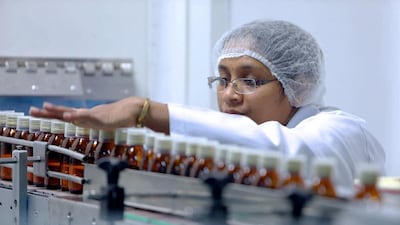For nearly eighty years, the economies of Gulf Cooperation Council countries have been driven by revenue from the hydrocarbon sector.
The Gulf accounts for almost 30 per cent of the world’s proven oil reserves and more than 22 per cent of global natural gas reserves, demonstrating the extent of the region’s reliance on oil. However, the oil price downturn has put more pressure on the Middle East’s battle for diversification as a means of surviving in a lower-for-longer oil price world.
Between 2000 and 2012, GCC countries grew at a compound average rate of 5.8 per cent per year, according to the IMF. However, to maintain this level of growth into the future with a lower oil price, we must continue to develop and diversify our revenue streams.
Thanks to the forward thinking of our leaders in the UAE, we are perhaps the most advanced in the journey to diversify, with a successful track-record of establishing and extracting value from a variety of non-hydrocarbon industries.
Non-oil GDP in the UAE already accounts for more than 60 per cent of total GDP, and Sheikh Mohammed bin Rashid, Vice-President and Ruler of Dubai, has set a goal to increase this figure to 80 per cent of GDP by 2021. To give an indication of the country’s robust and diversified economy, the UAE’s non-oil private sector economy rose to a 10-month high growth in July, according to the Emirates NBD Purchasing Managers’ Index.
The UAE has carved out several non-oil industries to support the diversification of the country: a strong financial hub, a world-renowned aviation industry, a healthy retail industry, a growing IT and tech sector and an advanced renewable energy initiatives. Now is the time to build on the foundations of our life sciences industry.
The sector is expected to grow globally by a huge amount in the coming years. According to a report by BMI, the life sciences sector is expected to reach Dh69.3 billion by 2019, representing 37 per cent growth from 2014’s Dh50.7bn. In addition, the industry is a hotbed for mergers and acquisitions, as companies look to take advantage of innovative new practices. According to Deloitte, the total deal value of life sciences M&A last year amounted to more than US$520bn, a hefty 47 per cent more than 2014.
Deloitte also believes that although economic woes are stunting pharmaceutical sales growth in certain regions, long-term prospects outweigh near-term challenges. From last year to 2019, both global health spending and pharma sales are expected to grow, driven by an ageing population and the roll-out of improved health insurance and medical services, particularly in developing markets.
Coupled with this data, the Mena region is likely to post the fastest healthcare spending growth globally, at about 9.3 per cent annually from last year to 2019. The GCC M&A market has also been active, the most notable deal last year being a $2.2bn acquisition of the UAE’s Al Noor Hospital Group by South Africa’s Mediclinic, which created an integrated healthcare group with a turnover exceeding $4bn.
The opportunity is there for the UAE to be at the forefront of the local and global surge in the development of life sciences and it is imperative we focus on the areas where we can build capacity and create a market.
The UAE has a huge reliance on international importation of pharmaceuticals. We must look to support manufacturers here to produce locally made pharmas and build our own market.
There are encouraging signs of this happening. For example, next year the local pharmaceutical distributor Al Ittihad Drug Store will open Pharmax, a $20 million facility to manufacture generic pharmaceuticals for the residents of the UAE at Dubai Science Park. This is a significant endorsement of the facilities at the park and also of Dubai as a centre of life science.
Another area where the UAE could capitalise on is the personalised medicine and digital health technology disrupters – such as tele-health, mHealth, wearables and social media – that are creating a paradigm shift in life sciences. The data is being used to transform aspects of health care that previously seemed out of reach for such technologies.
Health care is changing, with data as the catalyst, and as the UAE aims to cement its place as the world’s centre for innovation, this field of medical technology provides a clear opportunity for the UAE to own this space.
Within every challenge lies an opportunity. The UAE’s journey to diversify away from oil has so far been successful and further development in a growing and vibrant industry such as the life sciences sector would only serve to expand the revenue streams fuelling the growth of the country.
Marwan Abdulaziz is the executive director of Dubai Science Park
business@thenational.ae
Follow The National's Business section on Twitter

